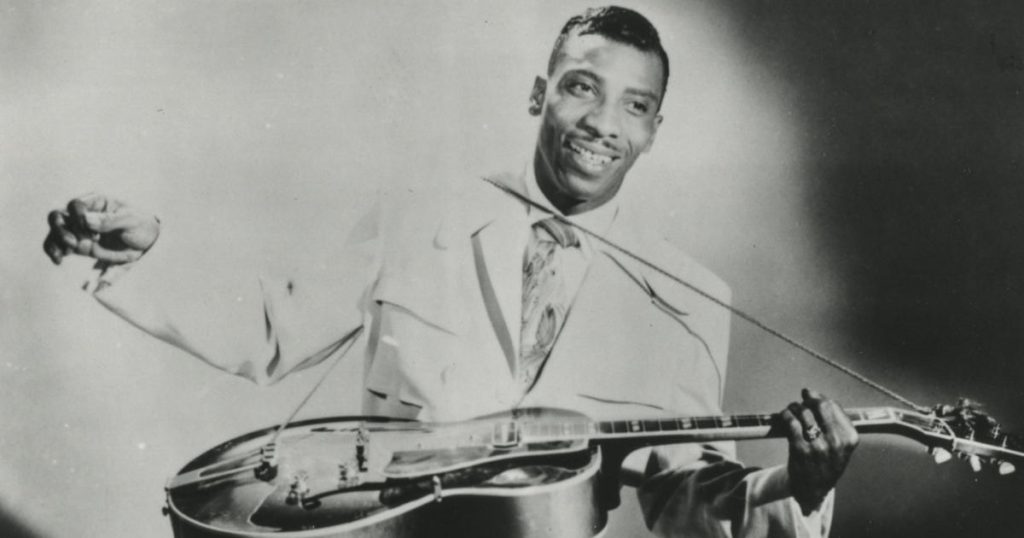
Aaron Thibeaux Walker made his recording debut on Columbia Records in 1929 as Oak Cliff T-Bone.
Picking his guitar and with piano accompaniment, Walker recorded “Wichita Falls Blues” and “Trinity River Blues” as the B-side.
“That dirty Trinity River sure have done me wrong,” the song goes. “It came in my windows and doors, now all my things are gone.”
T-Bone Walker grew up in Oak Cliff’s Tenth Street neighborhood, now an endangered historic district that is one of the only remaining freedmen’s towns in the United States, at a time when the levees weren’t as reliable as they are now.
Walker was born in the East Texas town of Linden in 1910. His mother left her husband and headed for Dallas to find a better life when Walker was a child. He attended N.W. Harllee school until about seventh grade. The school still stands on East Eighth Street, near Townview, and is now an early childhood education center.
Both of Walker’s parents were musicians. And his stepfather, Marco Washington, was a member of the Dallas String Band, a “pre-blues” or “country blues” band consisting of black musicians, which recorded 10 songs in the early 1900s, including “Chasing Rainbows,” “Dallas Rag” and “So Tired.” Washington taught Walker to play guitar, ukulele, banjo, violin, mandolin and piano, according to the Texas State Historical Society.
Blind Lemon Jefferson was a family friend and Walker’s mentor, and Walker often guided Jefferson to his gigs.
Walker began performing in clubs and on street corners as a teenager, and in the mid-1920s, he toured the South with Ida Cox. Later, he toured with Cab Calloway, and he played with Ma Rainey.
In 1935, Walker moved to Los Angeles. That same year, T-Bone went electric, becoming the first blues guitarist to play the electric guitar. He was a big draw in L.A. nightclubs such as Café Trocadero on the Sunset Strip, where he performed for racially integrated audiences beginning in the mid-1930s. Walker was a great dancer and captivating performer. T-Bone Walker was doing the splits on stage when rock ‘n’ roll pioneer Chuck Berry was still in grade school. Jimi Hendrix learned to play guitar behind his head and with his teeth after seeing Walker do it.
By the mid-1940s, Walker was a bandleader, landing gigs in big cities all over the United States. And that’s when he wrote “Stormy Monday.”
“They call it stormy Monday, but Tuesday’s just as bad.”
“Yes, Lord!” B.B. King said in a 2005 interview. “The first line, the first thrilling notes, the first sound of his guitar, and the attitude in his voice was riveting. I especially loved ‘Stormy Monday,’ and I still sing it today.”
Walker’s daughter, Bernita Walker, told NPR’s All Things Considered in 2008 that the song speaks to everyone.
“You know, Monday morning most people don’t want to get up to go to work ’cause they’ve had a great time over the weekend, and now they’ve got to hit that 9 to 5. Tuesday is just as bad. Wednesday’s worse ’cause that’s the hump day, and Thursday’s also sad.”
Walker first recorded the song in 1947, and it’s been covered by Bobby “Blue” Bland, B.B. King, Albert King, Eric Clapton, Van Morrison and Eva Cassidy, to name a few. It also inspired many blues guitarists to plug in.
The song is in the Blues Hall of Fame and the Grammy Hall of Fame. The Rock & Roll Hall of Fame named it among the “500 Songs That Shaped Rock and Roll.” And it’s in the Library of Congress’ National Recording Registry of “sound recordings that are culturally, historically or aesthetically significant.”
Walker was a pop star in the 1950s with many of his recordings making the top 10 on “Your Hit Parade.”
He joined the Count Basie Orchestra in the 1960s and toured all over Europe and the United States. At the end of his career, he became a living legend and a music festival draw.
Walker died of a stroke in 1975. He was inducted posthumously into the Rock & Roll Hall of Fame in 1987.




